|
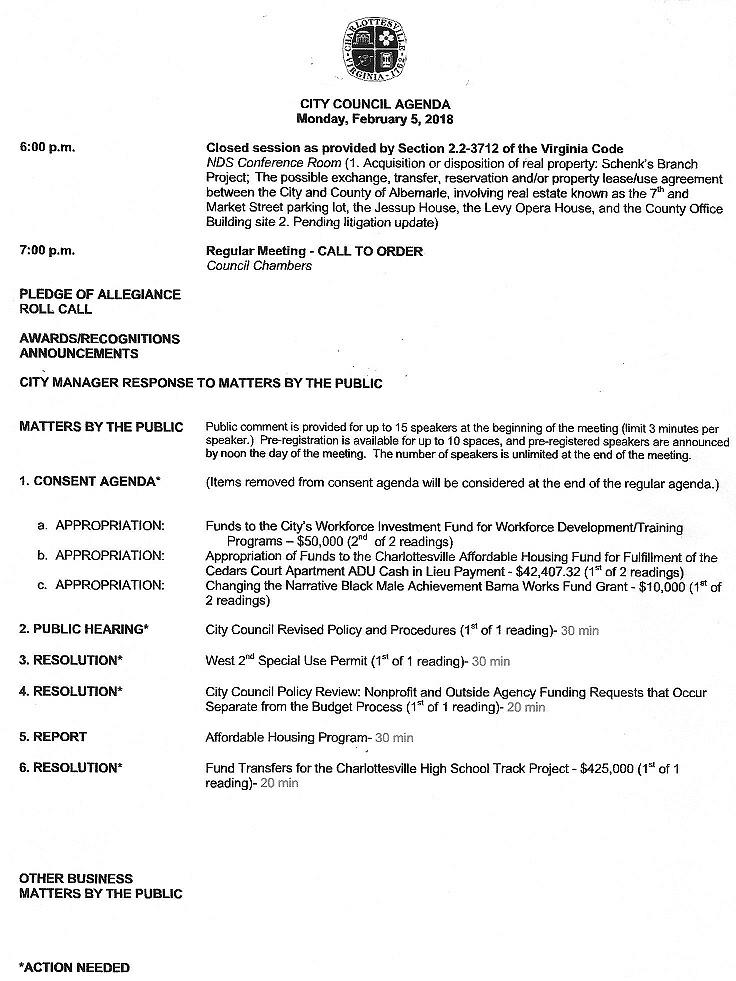 Affordable Housing Report 2017. Saturday February 3, 2018.
Affordable Housing Report 2017. Saturday February 3, 2018.
Regular City Council meeting Monday at 7 pm. Watch LIVE | Agenda with Background | City Council Page
"The City of Charlottesville currently administers a number of programs to address housing affordability [...] by (1) making existing housing more affordable for low-income senior, disabled and veteran households; and (2) encouraging the development, redevelopment, renovation and preservation of affordable housing throughout the City’s neighborhoods.
Commissioner of Revenue Programs
- The Real Estate Tax Relief for the Elderly or Permanently Disabled Program forgives a percentage of the real estate tax assessed during a given taxable year. To qualify for the program, homeowners must be (a) 65 years of age or older or (b) permanently disabled, with (c) combined household incomes no greater than $50,000 and (c) a net worth less than $125,000.
The tax relief remains as part of the 2006 City Charter Amendment Section 50.7 seeking sweeping new urban renewal powers. Council passed it 4 to 1 on Nov. 21, 2005. A Senate committee stripped out the Eminent Domain powers in January.
The charter amendment. Letter in opposition. Tax relief passed. Charlottesvile nonprofits are sitting on $7 billion in profits.
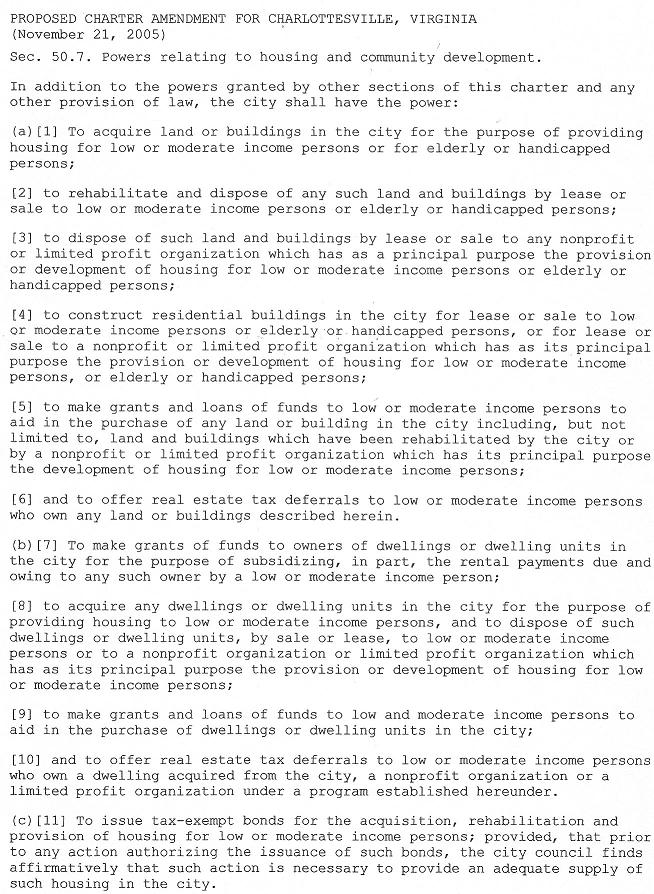
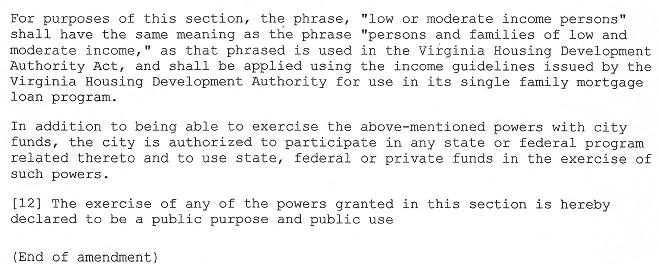
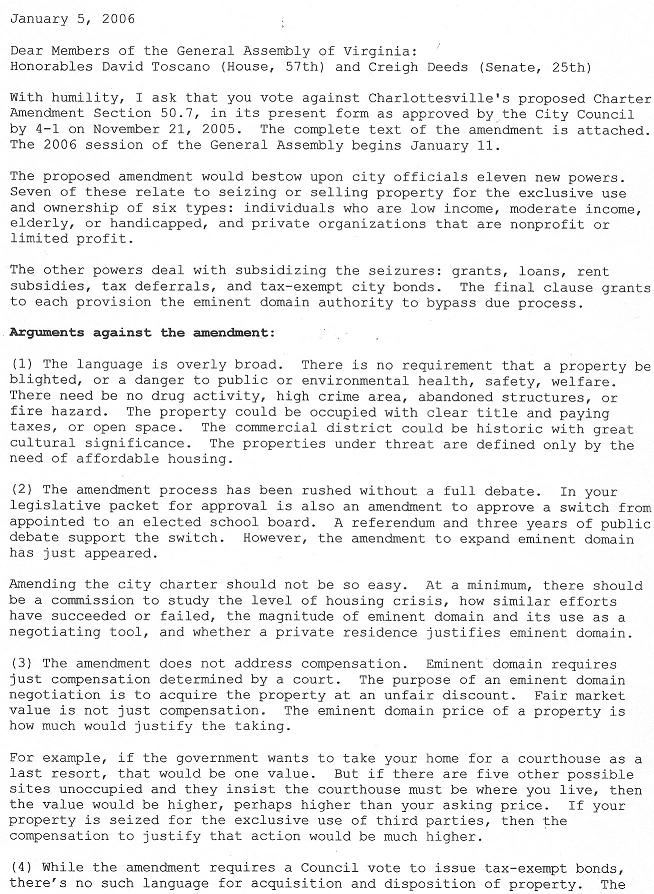
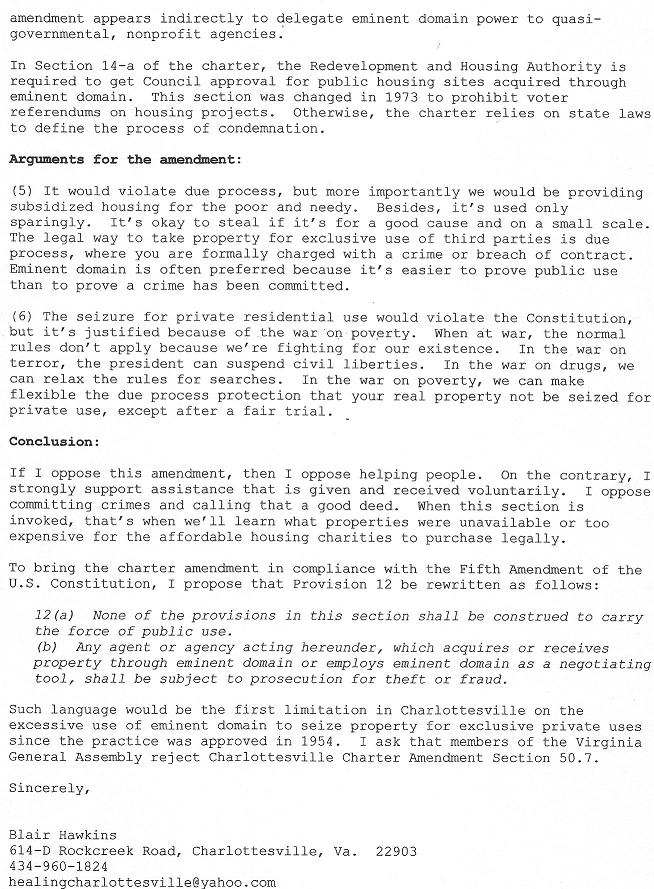
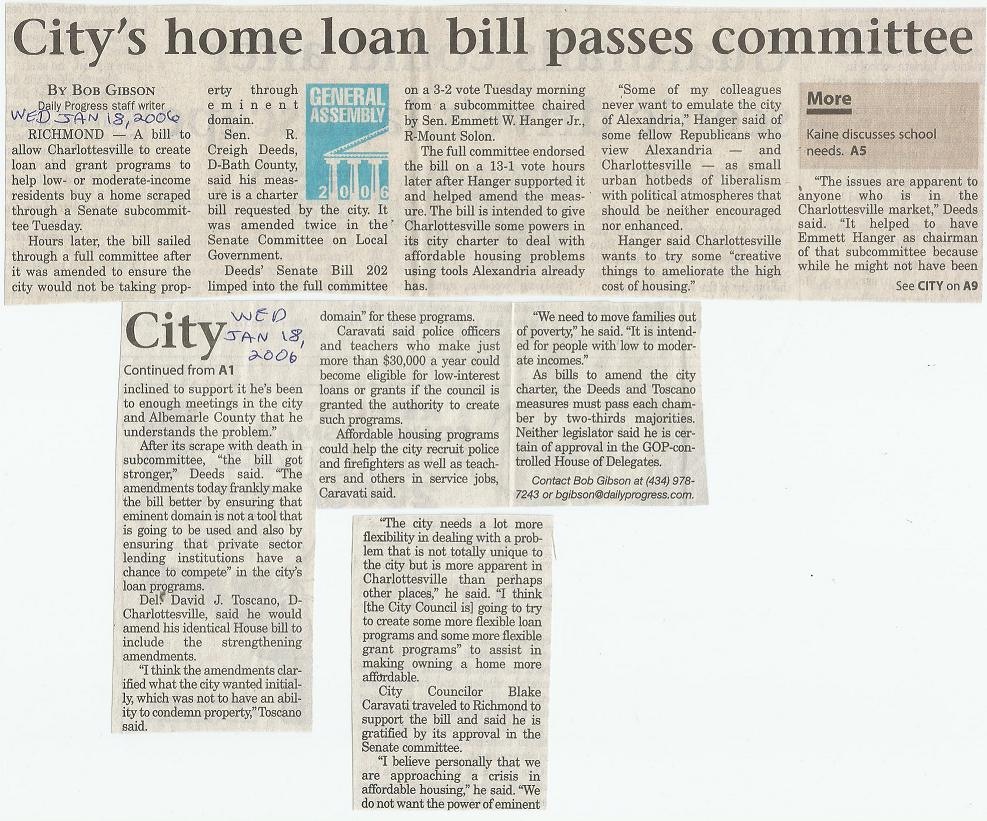
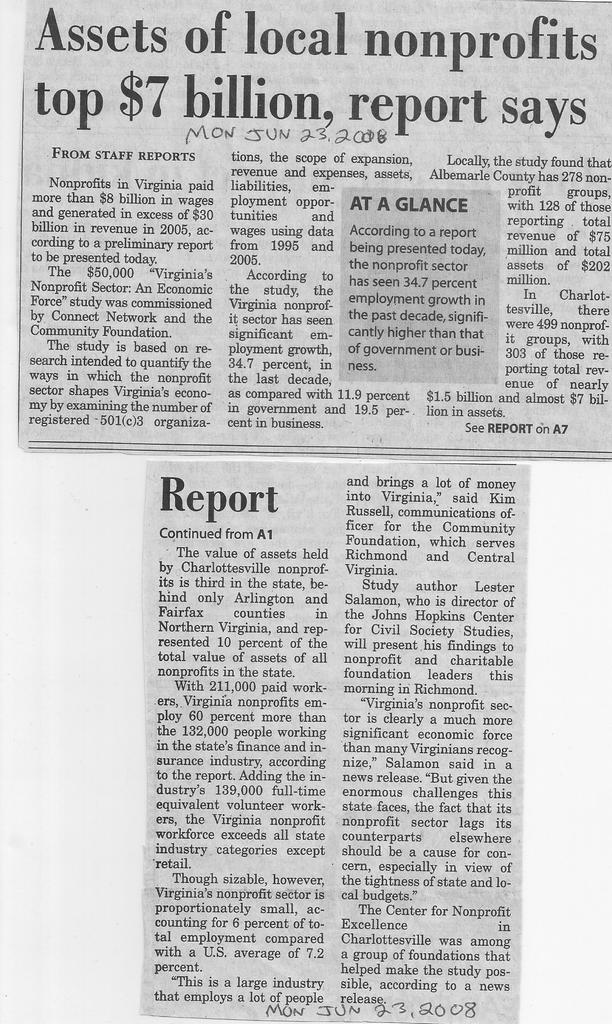
- The Disabled Veterans Real Estate Tax Exemption Program is available for any Veteran who: (a) has a U.S. Department of Veteran Affairs confirmed 100% service-related disability, (b) owns the property for which they are seeking the tax exemption, and (c) occupies that property as their primary place of residence. The tax exemption may apply to (d) surviving spouses of disabled Veterans, under certain circumstances.
In 2017, a total of 380 elderly/disabled and 10 Veteran households received an average of $1,299.38 of real estate tax relief and an average of $2,707.17 real estate exemptions per household respectively. - Homeowners who do not qualify for these programs, may qualify for assistance through the Charlottesville Housing Affordability Tax Grant Program, or CHAP. CHAP serves (a) non- elderly/disabled households with annual incomes less than $50,000 and (b) whose homes are valued at less than $365,000. In addition, homeowners applying for CHAP assistance (c) must not owe any delinquent real estate taxes or (d) own any other real estate.
The program is subject to annual renewal by City Council and, each year the program is renewed, the Commissioner of Revenue mails application materials directly to all homeowners who may qualify for the CHAP grant. In 2017, a total of 707 homeowners received an average CHAP grant amount of $439.71 each.
- Finally, the Rental Relief Program for the Elderly or Permanently Disabled provides grants to qualifying renter households to help offset the costs of rental housing. To qualify, applicants (a) must be 65 years of age or older, or (b) permanently disabled, with (c) combined household incomes no greater than $50,000 and (d) a net worth less than $125,000. Assistance is provided as a grant with the grant amount based on the previous year’s total rent payments. The average grant amount awarded this fiscal year equals $607.24 per household.
Table 1: FY 2018 Commissioner of Revenue Housing Affordability Programs
Program / Households Served / Total Amount
CHAP. 707 $310,875
Real Estate Tax Relief for the Elderly/Disabled. 380 $493,764
Disabled Veterans Real Estate Tax Exemption. 10 $21,071.68
Rental Relief Program for the Elderly/Disabled. 382 $231,965
Total 1,479 $1,057,675.68.
Neighborhood Development Services Programs
- In 2009, the City implemented an Affordable Dwelling Unit (ADU) Ordinance as a means for encouraging the inclusion of affordable housing in residential and mixed-use development projects undertaken in the City. The ordinance applies to any approved Special Use Permit or Rezoning applications with project densities greater than 1.0 Floor Area Ratio or an equivalent density based on units per acre.
For any project meeting these density thresholds, the project developer must: (1) provide ADUs on the development site, (2) provide ADUs at an off-site location within the City, or (3) make a cash contribution to the Charlottesville Affordable Housing Fund (CAHF). To date, the ADU Ordinance has resulted in more than $1.8 million being contributed to the CAHF and 14 homeownership ADUs being provided, with an additional five rental ADUs in the pipeline (see Table 2).
Table 2: Affordable Dwelling Unit (ADU) Ordinance Activity to Date
Project / # ADUs / Contribution to CAHF
1011 East Jefferson Street 5 $0.00
Cedars Court Apartments 0 $42,407.32
Lochlyn Hill 14 $0.00
The Pavilion at North Grounds 0 $278,095.00
The Plaza on West Main 0 $487,490.59
The Standard 0 $664,776.63
The Uncommon 0 $331,450.68
Water Street Promenade 0 $45,833.26
Total 19 $1,850,053.48
- Expedited permitting for affordable housing is provided through the ADU ordinance to encourage provision of affordable units. Under expedited permitting, once a rezoning or special use permit (a) has been approved, site plans submitted for review are acted upon by the director of NDS or the Planning Commission within 21 days of the plan being officially submitted. Expedited permitting also applies to (b) any preliminary site plan application which guarantees that (c) at least 15 percent of all proposed residential units included in the site plan will be affordable to households (d) with incomes no greater than 80 percent of Area Median Income (AMI) for (e) a minimum of 30 years.
- To further incentives the development of affordable housing units, NDS offers reductions in water and sewer connection fees. The cost reductions apply to the construction of units either for sale or rent to households earning 80 percent or less of AMI. The amount of reduction is based on the size of the water meter.
- Lastly, through its Free Paint Program, the City provides paint, primer, caulk and painting supplies to income qualified homeowners (i.e., those with household incomes up to 80 percent AMI) who can least afford to purchase such items to maintain the exterior of their homes. Homeowners may apply for program assistance once every five years.
Support for Charlottesville Redevelopment and Housing Authority Site Redevelopment Urban Renewal.
- Beginning with the FY 2018 approved budget, the City of Charlottesville is committing a total of $2.5 million dollars to support the Charlottesville Redevelopment and Housing Authority’s public housing redevelopment efforts. The funds will be drawn from the City’s Capital Improvement Fund, with an initial $250,000 set aside in FY 2018, and an additional $500,000 set aside each fiscal year between FY 2019 and FY 2022.
Housing and Grants Programs
- Located within NDS, the Housing and Grants programs provide funding support for a variety of affordable housing and housing related projects through the Federal HOME Investment Partnership Program (HOME) and the Charlottesville Affordable Housing Fund (CAHF). These funding sources provide direct financial assistance for affordable housing efforts through nonprofit partners, with an emphasis on support for construction of new units, preservation of existing units, and provision of down payment assistance. Housing initiatives funded through both programs must serve individuals and families with incomes equal to or less than 80 percent of AMI as defined by the United States Department of Housing and Urban Development. The most recent figures (effective 4/20/17) can be found in Table 3.
HOME is the largest Federal block grant to state and local governments designed exclusively to create affordable housing for low-income households. Funds can be used to support a wide range of affordable housing related activities including building, buying, and/or rehabilitating affordable housing for rent or homeownership, as well as providing direct rental assistance to low-income households. In Fiscal Year 2017, the HOME program supported a total of 29 housing projects in the city. Activities included: providing down payment assistance for 22 low- income homebuyers, rehabilitation of 23 owner-occupied homes, and two rental housing projects.
Established in 2007, the Charlottesville Affordable Housing Fund, or CAHF, is the City’s primary mechanism for promoting and supporting the creation, preservation and rehabilitation of affordable housing within the City. The CAHF is funded through annual allocations from the City’s Capital Improvement Program (CIP), as well as developer payments satisfying ADU Ordinance requirements, monthly rental payments related to the Local Energy Alliance Program lease agreement and repayment of any loan balances (i.e., home rehabilitation/preservation loans). The amount of CIP dollars allocated to the CAHF has increased 43 percent since FY2008, from $1.75 million to approximately $2.5 million.
Combined with the other CAHF funding sources, the total amount of City dollars allocated to the CAHF exceeds $20 million. Of this amount, more than $16 million (or 98 percent of total CAHF allocations) have been directly invested in affordable housing projects, creating or preserving an estimated 807 units of affordable housing since FY2008 .
Table 4: Total CAHF Funding from fiscal '07/'08 to '17/'18.
CIP Allocation $16,386,002.00.
CIP Plus Program Income & Transfers $20,344,332.92.
Excludes AHIP Emergency Repair Program.
Table 5: 10-year Breakdown of CAHF for Affordable Units.
Includes the $850,000 interest-free 5-year loan to Dogwood Housing's 57 units. In October 2017 the loan was extended for a third time. Other recipients include Piedmont Housing Alliance, Habitat for Humanity, Albemarle Housing Improvement program, Virginia Supportive Housing Single Room Occupancy Development (The Crossings), Jefferson Area Board for Aging, Thomas Jefferson Community Land Trust.
Appendix A includes other recipients and gives a more complete picture of the slush fund.
Slated for 2017/18 is $4.3 million to assist 236 units. Carlton Views II $1.4 million for 48 units. Community Services Housing $612k for 35 units. AHIP Scattered Site Rehabilitaion $803k for 22 units. Habitat Project 20 $480k for 16 units. CRHA Urban Renewal / Section 8 Supplemental Rental Assistance $900k for 79 units. Charlottesville Landlord Risk Reduction Fund $75K for 36 units.
2025 Goals for Affordable Housing, established in 2010, aims to ensure that SAUs (Supported Affordable Units) comprise 15 percent of the City’s total housing stock by 2025. Despite the significant investment in affordable housing through the CAHF, SAUs have consistently accounted for approximately 10 percent of the total housing stock since tracking began in 2010 (see Table 5). A number of factors account for the slow pace towards the 2025 goal including:
- Increased development of student and market rate housing, which has outpaced the capacity of local nonprofit providers’ affordable housing efforts;
- Decreasing amounts of developable land, and the increasing costs of available land in the City make affordable housing development financially unfeasible without significant financial support from government entities;
- A lack of data identifying gaps in affordable housing need and provision within the City hindering efforts to set appropriate annual targets for SAU development and preservation efforts; AND
- No mechanism with which to ensure the long term affordability of homeownership units beyond the initial CAHF beneficiary. This last issue is particularly important, as 16 percent of all of the City’s SAUs are homeownership units. Due to the lack of long term affordability measures for homeownership projects (including new construction, down payment assistance, and rehabilitation), the total number of SAUs in the City will decrease by 148 units (or 16 percent) over the next 20 years.
 Blair Hawkins Blair Hawkins
Home | Charlottesville, Virginia | blair@blairhawkins.net | Résumé | Top
|


 Blair Hawkins
Blair Hawkins
